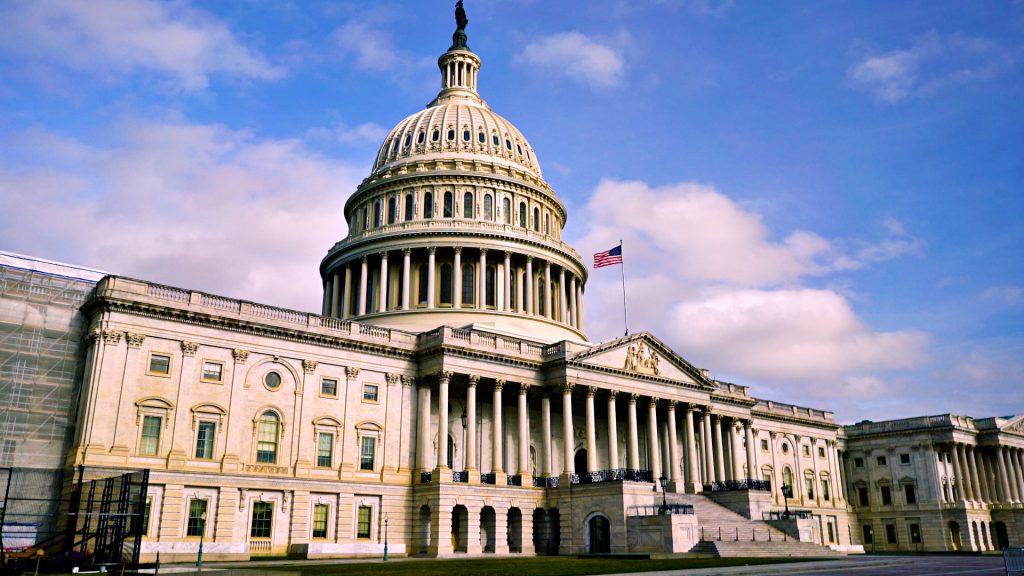After 40 days, US Senate votes to end record-breaking government shutdown

After 40 days, a group of Democrats decided to buck their party’s wishes on Sunday and vote in line with Republicans to move toward ending the government shutdown. The development came after Senate Majority Leader John Thune, R-S.D., convened a rare weekend meeting to break what days ago became the longest government shutdown in U.S. history.
The spending package narrowly passed Sunday with a final vote of 60 to 40.
Once approved, the amended three-bill package –– or “minibus” –– coupled with a clean continuing resolution, will be sent back to the House of Representatives for a vote before heading to President Donald Trump’s desk for a final signature. That is expected to take several days, and the government won’t officially reopen until the process is complete.
Speaking to reporters amid the Senate’s vote on Sunday night, Trump said he was confident the impasse would be resolved. “It looks like we’re getting close to the shutdown ending,” the president said. “You’ll know very soon.”
Who was involved in the negotiations?
Earlier Sunday, Axios reported that upwards of 10 Democratic senators were considering breaking ranks and voting alongside their GOP colleagues to end the shutdown. Republicans only needed five votes to reopen the government.
Sens. Jeanne Shaheen, D-N.H., and Maggie Hassan, D-N.H., were both eager to solidify federal funds for the Supplemental Nutrition Assistance Program (SNAP), which expired on Nov. 1, according to The Hill. Meanwhile, a handful of other lawmakers, including Sens. Jacky Rosen, D-Nev., Tammy Baldwin, D-Wis., Mark Kelly, D-Ariz., Jon Ossoff, D-Ga., Gary Peters, D-Mich., and Dick Durbin, D-Ill., spent the weekend holding “secretive negotiations” on a possible spending package to break the stalemate.
“A deal is coming together,” Thune said Sunday, before adding, “We’ll see where the votes are.”
Senate Minority Leader Chuck Schumer, D-N.Y., stuck by his no vote. “Make no mistake about it, the American people know who is inflicting this health care trauma –– Donald Trump and the Republican Party,” Schumer said ahead of the vote. “Americans will remember Republican intransigence every time they make a sky-high payment on health insurance.”
Sen. Bernie Sanders, I-Vt., was also staunchly against the amended package, saying that if he had the power to delay it further, he would. In a fiery speech minutes before the vote took place, Sanders criticized the lack of health care provisions, saying it would make a “horrific situation even worse.”
Meanwhile, on the Republican side, Sen. Rand Paul, R-Ky., said he would continue to vote no on the package, citing a provision that targets his state’s hemp industry.
What’s in the package?
The deal, comprised of three separate full-year funding bills in addition to the continuing resolution, includes a December vote on the extension of Affordable Care Act subsidies, one of the main sticking points in Democrat negotiations since the shutdown began on Oct. 1. Many Democrats took umbrage with the fact that the promise of a vote was included, as opposed to a concrete extension of the subsidies.
“I am unwilling to accept a vague promise of a vote at some indeterminate time, on some undefined measure that extends the health care tax credits,” Sen. Richard Blumenthal, D-Conn., said of his decision to vote no.
Likewise, there is a provision to reverse federal employee layoffs resulting from the shutdown, mitigate reductions-in-force, and ensure that furloughed employees receive backpay for wages they’ve missed over the past 40 days.
Also addressed in the package are funds for defense spending, SNAP benefits, veterans affairs, the Department of Agriculture and the legislative branch through fiscal year 2026. The rest of the federal government will be funded through Jan. 30, 2026.
Read the full text of the bill below:
The post After 40 days, US Senate votes to end record-breaking government shutdown appeared first on Straight Arrow News.





